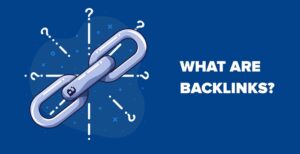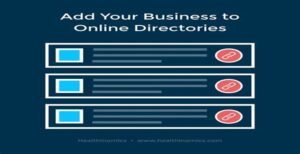While On-Page SEO is all about refining your own website to make it more palatable for search engines, Off-Page SEO is a different ball game. It’s about enhancing your website’s authority in the eyes of search engines through the creation of backlinks from other websites. Think of it as a popularity contest. Your website will appear more popular to search engines and rank higher in search results the more high-quality backlinks it has. But why is Off-Page SEO important? Imagine you’re at a crossroads with multiple signposts pointing in different directions. You’re more likely to follow the path that most signposts are pointing towards, right? That’s how search engines view backlinks. They’re like signposts pointing towards your website. The more you have, the more likely search engines are to direct traffic your way.

The Importance of Backlinks: The Building Blocks of Off-Page SEO
In the world of Off-Page SEO, backlinks are the stars of the show. However, what are backlinks and why are they so significant?
Backlinks, also known as inbound links or incoming links, are links from other websites that point to your own website. They’re like the roads that connect different towns and cities on a map. The more roads lead to a particular city, the more important that city is likely to be. Similarly, the more backlinks a website has, the more important it appears to search engines.
But it’s not just about quantity. The quality of the backlinks also matters. A backlink from a highly reputable website is like a recommendation from a trusted authority. It carries more weight than a backlink from a lesser-known website. As per Moz, a leading SEO software company, links from high-authority websites can significantly improve your website’s search engine ranking.
Backlinks also play a crucial role in how search engines discover new webpages. When a webpage links to another webpage, search engines can follow that link and discover the linked page. This is how new pages get indexed and become part of the vast web that search engines crawl.
Moreover, backlinks can drive referral traffic to your website. When someone is reading a blog post or an article and they click on a link, they’re taken to the linked website. This referral traffic can increase your website’s visibility and potentially lead to higher conversion rates.
So, how can you build high-quality backlinks? There are several strategies you can use, from creating shareable content and guest blogging to leveraging social media and online directories. But remember, building backlinks is a long-term strategy. It requires time, effort, and patience.
Today backlinks are known to be most significant aspects of off-page SEO. They can boost your website’s authority, improve your search engine ranking, and drive more traffic to your site. So, start building those backlinks and watch your online presence grow!
How to Build High-Quality Backlinks
Creating backlinks of excellent quality is a vital component of Off-Page SEO. These backlinks serve as endorsements of your website’s content, signaling to search engines that your site is a valuable resource worthy of citation. However, not all backlinks are created equal. The quality of the backlinks you earn matters significantly. So, how can you build these high-quality backlinks? Let’s explore some effective strategies.

Guest Blogging
Guest blogging is a tried-and-true method for building backlinks. It includes composing a blog posting for a different website within your sector. In return, you’ll usually get a backlink to your website in the author bio or within the content itself. This strategy not only helps you build backlinks but also allows you to reach a wider audience. As per HubSpot, guest blogging is a two-way street, benefiting both the host website and the guest blogger.
Broken Link Building
Broken link building is another effective strategy. It involves finding broken links on other websites, creating content that matches the content of the original link, and then asking the website owner to replace the broken link with a link to your new content. This strategy can be a win-win situation. The website owner gets to fix a broken link, and you get a backlink to your site.
Creating Shareable Infographics
Infographics are highly shareable, making them a great tool for building backlinks. They present information in a visually appealing and easy-to-understand format, which can make them popular on social media and other platforms. By creating unique, informative infographics and sharing them on your website, you can encourage others to share your infographics and link back to your site.
Leveraging Social Media
While social media links might not have the same SEO weight as traditional backlinks, they can still play a role in your link-building strategy. By sharing your content on social media, you can increase its visibility, which can lead to more people linking to it. As per Sprout Social, a leading social media management platform, social shares can indirectly influence your SEO rankings.
Participating in Relevant Forums
Participating in forums and online communities related to your industry can also help you build backlinks. By providing helpful answers and including a link to relevant content on your website, you can establish your authority and generate backlinks. However, it’s important to be genuine and helpful, not promotional, when participating in forums.
Building high-quality backlinks is a multifaceted process that requires time, effort, and strategic planning. But the payoff can be significant. By earning high-quality backlinks, you can boost your website’s authority, improve your search engine rankings, and increase your online visibility.
Social Media and SEO: A Powerful Combination
In the interconnected world of the internet, social media and SEO go hand in hand. While social media links may not have the same weight as traditional backlinks in the eyes of search engines, a robust social media presence can significantly bolster your brand’s online visibility and create more opportunities for backlinks.
Social media platforms like Facebook, Twitter, LinkedIn, and Instagram offer businesses a way to engage with their audience, share content, and build a community. Each post, tweet, or update is an opportunity to provide value to your audience and direct traffic back to your website.

Moreover, social media can amplify the reach of your content. When people share your content on social media, it can be seen by a wider audience. This increased visibility can lead to more people linking to your content from their websites or blogs, resulting in more backlinks.
As per Social Media Today, one of the leading online resources for social media news and tips, social signals such as likes, shares, and follows are not direct ranking factors for search engines. However, they can indirectly influence your SEO efforts. For instance, a viral social media post can lead to a surge in backlinks, which can boost your search engine rankings.
Furthermore, social media profiles often rank in search engine results. Therefore, a strong social media presence can help your brand dominate the search engine results page, pushing down any negative content and ensuring that potential customers see your brand in the best light.
While social media may not directly contribute to SEO in the way that traditional backlinks do, it plays a crucial role in enhancing your brand’s online visibility, driving traffic to your website, and creating opportunities for backlinks. So, don’t underestimate the power of social media in your SEO strategy!
Online Directories and Local SEO: Boosting Your Local Visibility
Online directories play a key role in this land of local SEO. These directories are like modern-day phone books, providing a platform for businesses to list their information and make it accessible to potential customers. For local businesses, being listed in these directories can significantly enhance their local SEO and increase their visibility among local customers.
Online directories like Google My Business, Yelp, and Bing Places for Business allow businesses to list important information such as their name, address, phone number, website, hours of operation, and more. This information is then indexed by search engines and can appear in local search results and on map displays.
Being listed in these directories can provide several benefits. Firstly, it can improve your local SEO. Search engines like Google consider the information in these directories when determining local search rankings. Having accurate and consistent information across multiple directories can signal to search engines that your business is legitimate and reputable.
Secondly, online directories can increase your online visibility. Utilizing these online directories to locate local companies is common. Being listed can put your business in front of these potential customers.

Lastly, online directories can drive traffic to your website. Many directories allow businesses to include a link to their website. This not only provides a convenient way for potential customers to learn more about your business but also creates a valuable backlink to your website.
As per BrightLocal, a leading local SEO platform, businesses that are listed in online directories are likely to see a boost in their local search rankings. They found that the average business is listed in 39 directories, highlighting the importance of this strategy in local SEO.
Online directories are a powerful tool for local businesses. By ensuring your business is listed in these directories, you can improve your local SEO, increase your online visibility, and attract more local customers.
In conclusion, Off-Page SEO indeed has the potential to significantly amplify your online presence. By building high-quality backlinks, leveraging social media, and listing your business in online directories, you can enhance your website’s authority, improve its search engine rankings, and increase its visibility. This can lead to more traffic, more leads, and ultimately, more customers for your business. So, whether you’re a small local business or a large corporation, investing in Off-Page SEO can yield substantial benefits.

Leave a Reply